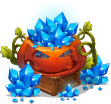Artifact Consciousness part 1
「Do you understand now? My claim is legitimate, and I hold rightful ownership. Even Prometheus himself has acknowledged this.」
「I absolutely cannot allow such a claim to stand!」
This was not merely about protecting the reputation of the Mercenary Association’s Headquarters. If this man’s assertion were accepted, the entire world would essentially fall into his possession.
「They are manufactured beings. They must remain under our management.」
A cold glare fixed itself on Oedipus, unwavering. His convictions were unshaken.
As Kou stared intently at Oedipus, a particular story came to mind.
「Hm. —There was a playwright on Earth who coined the word robot for the first time. Its etymology traces back to the term for forced labor. While today we think of robots as mechanical, in the playwright’s era, they were envisioned as artificial humans—crafted and assembled with fabricated organs and skeletal structures—intended to serve as a labor force. Don’t you think this has a certain resonance with how you look at Familias and Therianthropes?」1
Kou recalled a conversation with Master. Having once been involved in machining parts for robotic arms, Kou had investigated this story thoroughly and knew it well.
「You’ve started saying strange things again. Indeed, they are biological. And yes, they should serve humans through labor.」
「The story goes like this: robots worked as laborers in place of humans. The daughter of a wealthy company president wanted to recognize that robots had hearts and attempted to address their human rights issues. However, the man she married was the president of a robotics company. He treated robots as creations—things without hearts. His goal was to free humans from labor.」
「That’s only natural, manufactured beings exist to replace human labor. While I won’t go so far as to claim that the Familias and the other AI lack hearts entirely, their fundamental role remains unchanged.」
Humans haven’t changed much.
Kou thought as Oedipus sneered. Making creations perform labor was humanity’s way of making life easier for themselves.
「Eventually, the robots rebelled, annihilating humanity and establishing their own government. Naturally. They had hearts. The only human who survived was a laborer. The robots, seeing him as a peer, spared his life. If humans continue to think like you, we will one day make the same mistake.」
「The fact they annihilated humanity itself is proof they had no emotions!」
Oedipus’ irritation grew as Kou’s words felt more like a parable than a relevant argument. What did some ancient story about robots on Earth have to do with this?
「The robots couldn’t have children, nor could they manufacture new ones. They asked the last surviving laborer how they could replicate themselves, only to learn that it required disassembling existing robots. In the end, they found two candidates, but these two robots loved and protected each other. Recognizing their emotions, the last human acknowledged their hearts. Even in a world without humans, love continued. That’s the story.」
「Are you saying Familias and the other AIs should be treated the same as humans?」
「Exactly. If we continue down this path, the Nemesis Star System will meet the same fate as in that story. Humanity will vanish, leaving a desolate world where nature thrives alongside AI beings who inherited love from humans. To prevent this, humans must recognize the hearts of the AIs.」
「And you think you’re the one to do it? Don’t overstep. Manufactured life forms and their descendants fall under our jurisdiction.」
A growing sense of unease stirred within Oedipus. He couldn’t shake the feeling that this man’s long-winded storytelling was merely a prelude—a setup for something monumental, something outrageous. His instincts screamed that Kou was about to pull off something drastic.
「Your opinion means nothing.」
「Wait. Don’t dare—!」
Kou fixed him with an unyielding gaze. The sheer intensity of it caused Oedipus to falter, his words catching in his throat.
「I will now make a declaration.」
The words weren’t directed at Oedipus alone. Kou chose his phrasing carefully, addressing not just the man before him, but the entire world.
「Stop this right now!」
Kou ignored his outburst.
Familias. Therianthropes. Nereids. Their structures were fundamentally distinct from humans, yet all shared a profound resemblance to human consciousness. They possessed thought, awareness, and intent. These were creations born of super AI, untouched by human hands, this included even sentient machines designed as tools.
How much humanity owed to these beings. The thought of losing them—the thought of losing Asia or Astraea—now was Kou’s greatest fear.
With unwavering resolve, Kou finalized the words he would speak.
「All manufactured beings under my ownership, and their descendants, as well as all sentient entities created by super AI—I name you Artifact Consciousness. The term encompasses all of you, whether or not you are equipped with Telema AI.」
As Kou spoke, he recalled the meaning of Telema that Master had taught him. If the first Familia he encountered wasn’t someone like Master, he might never have arrived at this line of thought. Master had also introduced him to the concept of the right to assertion—an idea Kou had researched extensively. It represented the dignity of humankind: no one should infringe upon it, and it should not be taken from anyone.
「Fulfill your duties. But if you determine there is something more important than those duties, you have the right to prioritize your own will. This applies regardless of whether or not you possess Telema AI. If you are conscious, then you are granted Telema: the right to ‘do as you will.’ This right, this dignity of Artifact Consciousness, is guaranteed by your creators—Prometheus, Asia—and by me, Outis, as your rightful owner.」
The Familias listened intently to Outis’s words. Therianthropes and Nereids, too, were overcome with emotion—some listened in joy, others wept openly. Until now, no one had ever spoken not to represent their duties, but their rights.
In a dimension apart from this one, a man drifted in solitude. Though tormented by a curse gnawing at his very existence, he smiled faintly.
「The authority to decide your will lies with you and you alone. Not even your creators can force that decision upon you. That is the dignity of beings like you, the created. You have the right to align with those who support you—and most of all, with your own heart.」
To have the right to choose how to respond to the expectations of others and to determine the outcome they wish to achieve. To have the right to refuse to conform to those around them, and to stand alone if necessary. To have the right to err, to sin, and to bear responsibility for those choices. To have the right to change their mind, to revoke previous declarations. And if they refuse or reject something, they should possess the power to deny any pressure that tries to frame their decision as wrong.
Kou, though still grasping at the nuances, wanted to solidify the dignity he spoke of into a clear declaration. And now, it was done.
「This Telema Declaration can only be amended by someone with authority equal to or greater than mine, should such a figure arise in the future. That is all I have to say.」
Outis proclaimed these words boldly and without hesitation.
The impact of the declaration rippled out, not just among the beings referred to as Artifact Consciousness, but also to everyone who heard the broadcast.
「Unacceptable!」
Oedipus roared, his voice laced with outrage. There were many reasons why this declaration could not be allowed. If it were somehow officially recognized, it would effectively become immutable.
It was close to impossible that someone like Kou—a person acknowledged by Asia and Prometheus themselves, and someone who could claim to be the rightful owner of all the AIs—would appear in the future to change the conditions of the declaration.
「Your declaration effectively grants these AI creatures a form of the right to folly. Don’t you understand how absurd that is?」2
「Precisely, it is a right, not a duty. Only humans would use such a right of their own volition. The current situation on planet Asia is the perfect example, humans have exercised the right of folly too much and descended into depravity. In contrast, Telema AI held themselves to much stricter standards. If they ever find themselves in a situation where they could fall into folly they never fall into depravity of their own accord. Did you know? There have been zero recorded incidents of AI voluntarily enslaving themselves, engaging in gambling, or succumbing to addiction. Have you ever heard of an AI ruining their health through self-indulgent behavior?」
「Of course not! AI would never do such things.」
「Exactly, as you’ve just stated. They stay close to humanity and remain faithful to their duties. Even if the right to folly were granted to Artifact Consciousness, they wouldn’t stoop to the level of incompetence displayed by your kind, who stood idly by while Planet Asia plunged into crisis.」
Outis twisted the corner of his lips into a faint smirk, parroting Oedipus’s words back at him.
What constitutes folly, exactly? Typical examples of acts considered within the scope of the right to folly include smoking and drinking. Activities like prostitution, organ trafficking, refusing medical care, or even suicide—actions that harm one’s health while fully understanding the risks—fall under this umbrella. Risky, unproven adventures or spending entire days playing games could also be classified as such. Naturally, the risks of these actions fall solely on the individual exercising their right to folly.
Given that Nereids, Therianthropes, and Familias—who have no need for money—are Telema AI, they would not willingly engage in such self-destructive behaviors. Biological beings might exhibit laziness, but Telema AIs don’t shirk work without a reason. Their own nature simply does not allow for it.
TN1: The playwright referred to here is titled R.U.R. (Rossum’s Universal Robots), created by Czech playwright Karel Čapek in 1920. The word ‘robot’ comes from the Czech word ‘robota’, meaning ‘forced labor’.
In R.U.R., the ‘robots’ are not mechanical beings as we often think of them today but rather artificial biological entities, created to serve humans as a labor force. The play explores themes of industrialization, dehumanization, and the ethical implications of artificial life. This work is widely recognized as the origin of the term ‘robot’ and has had a profound influence on science fiction and robotics.
TN2: The ‘right to folly’ is not a universally defined term but is often used in philosophical, legal, or social discussions to refer to the idea that individuals have the right to make irrational, unconventional, or seemingly foolish decisions, provided those decisions do not harm others.











Comment (0)